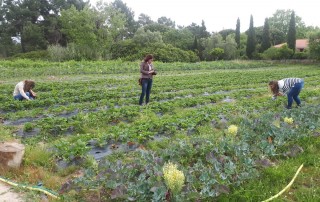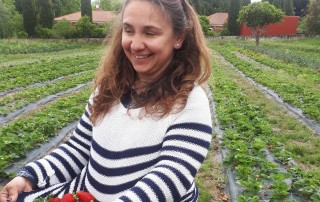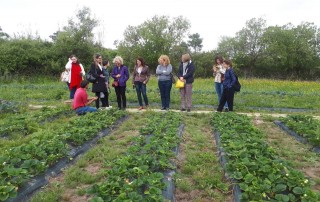PROVE aims to build relationships between small-scale farmers and consumers, allowing farmers to directly sell their local, seasonal fruits and vegetables to customers through an online platform. By providing farmers with tools and training it also helps them to self-manage their farm and create an income source in a context of economic deceleration and a struggling agricultural sector. On 7 May 2019, INHERIT partners working on food-related case studies had the opportunity to visit a PROVE farm in the Setúbal province, south of Lisbon, to learn first-hand about the project.
In total, the PROVE initiative involves over 140 farmers, thousands of consumers, and two dozen district promoters (responsible for growing the network), mostly located around Lisbon and Porto. One of these promoters is ADREPES, the Association for Rural Development in the peninsula of Setúbal. Natalia Henriques, head coordinator of ADREPES, organised a site-visit to one of the PROVE farms for INHERIT partners EuroHealthNet (Belgium), Gezond Leven (Belgium), the Lisbon University Institute (ICSTE-IUL, Portugal), the Dutch National Institute for Public Health and the Environment (RIVM, The Netherlands), University College London (UCL, UK), and the University of Alcalá (Spain).
Warmly welcomed by Solange Julião and her husband Hélio Julião, INHERIT partners learned about their journey to becoming PROVE farmers, which began when they both lost their jobs during the economic crisis in 2008. This led the couple to decide to try something new, and initially to start a farm in the North of Portugal. When this did not work, they persisted and tried again, this time in the Setúbal province, south of Lisbon. Benefitting from EU funding (EQUAL and PRODER programmes), they focused to begin with on growing medicinal herbs and plants, but quickly expanded to grow a wide selection of seasonal crops, using only organic methods.
Joining PROVE has helped them to establish relationships of trust with customers, with whom they interact directly, supplying them with a varied basket of fresh fruit and vegetables on a weekly or bi-weekly basis. Solange and Hélio have a very open communication channel with customers, letting them know in advance what the baskets will contain and thus allowing them to plan meals. By including some ingredients that are not commonly known or used, the baskets encourage customers to try new products. Farmers can use the platform to share recipes with their customers, and customers can also swap recipes amongst themselves at the delivery sites.
Alongside individual consumers, Solange and Hélio also work with restaurants, including Michelin-starred chefs, and two restaurants owned by previous PROVE customers who decided to open restaurants serving biological vegan food. Solange and Hélio also make and sell some home-made products, such as very popular spicy marmalade and vinegar, based on a recipe idea suggested by one of these chefs. In the future, they are planning to create a kitchen on their farm, inviting chefs to cook directly on their premises.
INHERIT partners had the opportunity to explore the farm and learn about the different products being grown and the methods that are used. Partners were invited to taste some of these products, including spring onions, carrots and strawberries.
On the whole, PROVE has contributed to the success story of this farm. Solange and Hélio are also challenging the stereotypes of the farming sector, as they are both educated and were working as a psychologist and IT technician before losing their jobs in the crisis. But it is not all plain sailing. Working the farm remains hard labour, and it is a struggle to find employees to work with them, with young people in particular still not seeing this as a viable career path. The way ahead for PROVE is also not easy, as it now needs to establish itself with its own independent source of funding in order to be able to continue to exist once support from the EU and other funding bodies ends. In the meantime, an opportunity to widen the reach of PROVE among consumers is already being developed, as a PROVE subscription is being piloted by a school.
The potential success of this project – as well as the challenges and opportunities – have been analysed by ICSTE-IUL, who looked at both qualitative and quantitative data to understand the main learnings which can be drawn from PROVE. As this study was carried out in the context of the INHERIT project, the analysis looks particularly closely at whether and how PROVE promotes environmental sustainability, better health, and equity. Overall, findings suggest that belonging to the PROVE networks empowers farmers and increases their wellbeing, and ensures that customers eat higher amounts of fruits and vegetables. These benefits could be further expanded by reaching out to lower socioeconomic consumers and promoting more alternatives to animal-protein. More detailed findings will feature in an INHERIT report published in early 2020.



